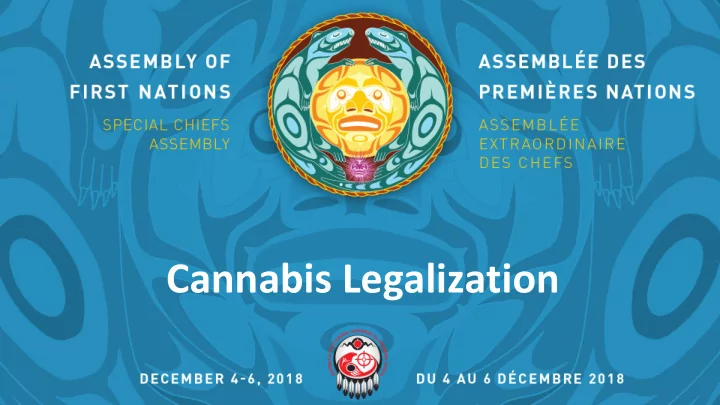

Cannabis Legalization
Bill C-45 Cannabis Act • In 2017, the Minister of Justice and the Attorney General of Canada introduced Bill C-45 (Cannabis Act), which would amend the Controlled Drugs and Substances Act, the Criminal Code, and other Federal legislation to enable legal access to recreational cannabis. • The Bill received Royal Assent on June 21, 2018, and the Bill was enacted on October 17, 2018. • The Cannabis Act is to provide legal access to cannabis and to control and regulate its production, distribution and sale.
Cannabis Act Objectives • The primary objectives of the Act are: – to prevent young persons from accessing cannabis; – to protect public health and public safety by establishing strict product safety and product quality requirements; and – to deter criminal activity by imposing serious criminal penalties for those operating outside the legal framework.
Cannabis Act, Bill C-45 Legal under Act: • Legal age to possess recreational cannabis is 19 years (18 years in AB and QC). • Possess up to 30 g of dried cannabis or equivalent in non-dried form in public. • Share up to 30 g of legal cannabis with other adults. • Grow up to 4 cannabis plants per residence (not in MB and QC).
Cannabis Act, Bill C-45 cont’d • Currently, fresh or dried cannabis, cannabis oil and seeds for cultivation are permitted for legal sale. • Cannabis containing products, such as food and drinks, can be made in home. • Other products, such as edibles and concentrates, will be permitted for legal sale within one year of legalization. • Regulations for edibles and concentrates are expected in 2019.
Cannabis Act, Bill C-45 What Will Remain Illegal: • Possession, production, distribution and sale outside the legal framework. • Giving or selling cannabis to youth. • Using youth to commit cannabis-related offences. • Drug-impaired driving. • Travelling with cannabis across international borders, even medical cannabis. • Bringing cannabis from another country into Canada.
Areas of Consideration for First Nations • The Cannabis Act implies a number of impacts on First Nations. • Areas of consideration: – First Nations cultural vision of safe families – Potential health impacts – Revenue sharing and economic opportunities – Social impacts in First Nations – Federal/provincial/First Nation government authorities – Law enforcement communication and accountability to First Nations governments.
Health Impacts Mainstream research site the following potential health impacts of recreational cannabis use: • Long-term health effects of cannabis use. • Dependency / addictions. • Mental health / physiological problems. • Lung infections & disorders.
Health Impacts Cont’d Preliminary research sites the following potential health benefits of medical cannabis use: • Nausea in cancer patients • Improve appetite in HIV/AIDS patients • Reduction in chronic pain • Spasticity reduction in Multiple Sclerosis • Reduction of seizures in Epilepsy
Social Impacts Research points to the following social impacts resulting from cannabis legalization: • Reduction of the black market • Lower educational attainment • Increase of delinquency and aggression • The potential increase in youth cannabis use • Domestic violence and/or child neglect • Financial stress in low income families
Economic Opportunities Economic Opportunities include: • Licensed producers, retail locations, research/development of own products, etc. • A federal license is required to produce or sell cannabis. • Health Canada has developed a Navigator service to assist First Nations applicants throughout the cannabis licensing process. • Contact: navig@Canada.ca • Retail license processes varies by province/territory. • If interested in retail licenses on First Nations, contact province/territory.
Jurisdictional Issues • First Nations require the right to regulate their own affairs from the production and sale of products on-reserve. • Competing and ambiguous jurisdictional challenges. • Current Bill does not recognize First Nations jurisdiction over reserve land. • i.e. Muscowpetung Saulteaux Nation, SK, developed their own cannabis laws and opened a store on reserve land. The Province of SK claims Muscowpetung Saulteaux Nation is operating illegally and not following provincial framework. If consensus cannot be reached, it could end up in court.
First Nations Priorities Looking Forward: • Ensuring the recognition and respect of First Nations jurisdiction. • First Nations need the right to implement by-laws to regulate cannabis and recreational retail stores on-reserve. • Government funding on-reserve for economic opportunities and social programs.
National Task Force on Cannabis • A National Task Force on Cannabis has been established to further support a path towards greater dialogue, policy discussions, planning and capacity considerations as result of the Cannabis Act. • New chair of the Task Force is Regional Chief Terry Teegee, with representatives from the AFN’s Youth Council, Women’s Council and Elder’s Council. As well as representatives from a First Nations Health Agency and a First Nations Police Agency. • The Task Force had their inaugural meeting on June 8, 2018.
Time Line of Activities • Development of literature review of Medical Cannabis literature review. • Environmental scan of Cannabis Legislation across Canada. • Preliminary research on economic and jurisdictional aspects of cannabis. • Monthly meetings with Cannabis Legislation and Regulation Secretariat for information exchange. • Development of AFN Excise Tax Committee. • Preliminary discussions with NIHB Joint Review Steering Committee on adding medical cannabis to the formulary.
Next Steps • National Cannabis Summit – proposed for 2019. • Meeting of NCO with Minister of Health and Minister of Border Security and Organized Crime Reduction. • Distribution of cannabis infographics and informational materials. • Final report to Health Canada.
Questions
Recommend
More recommend